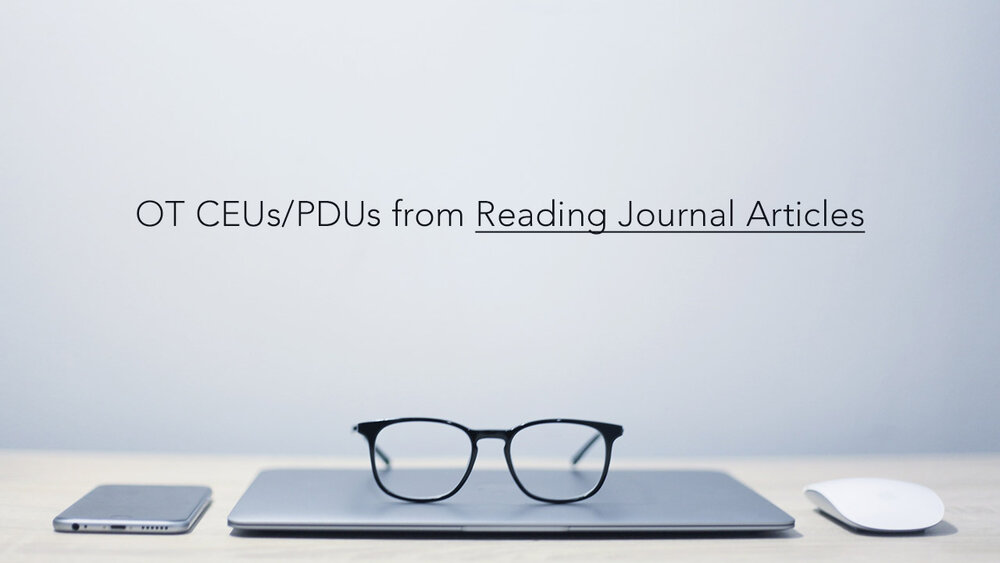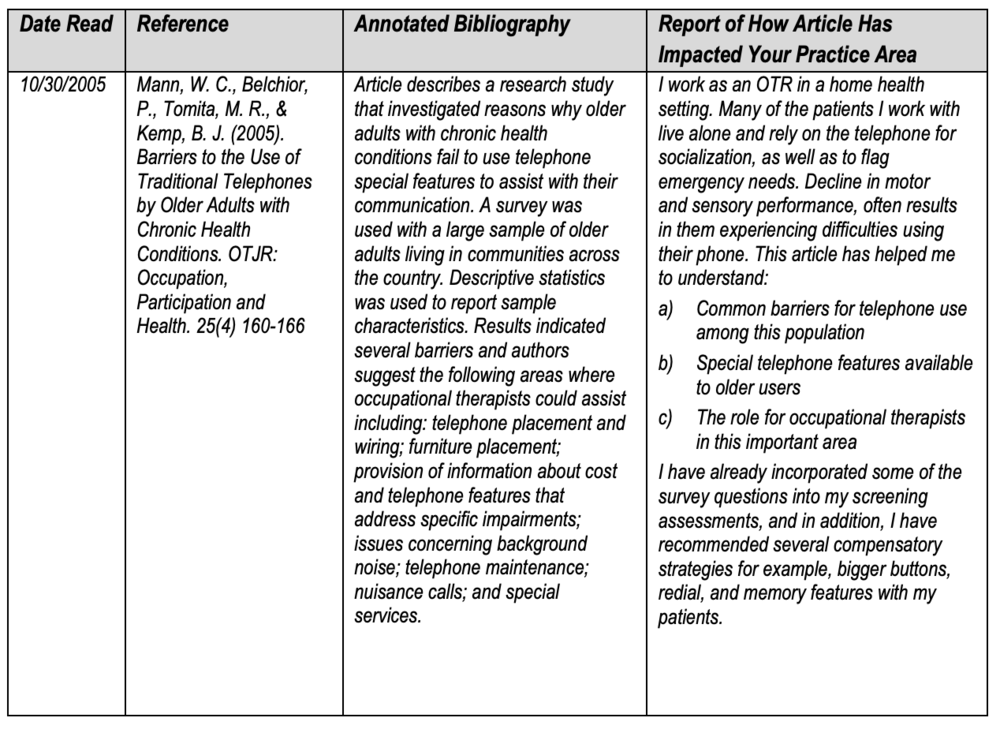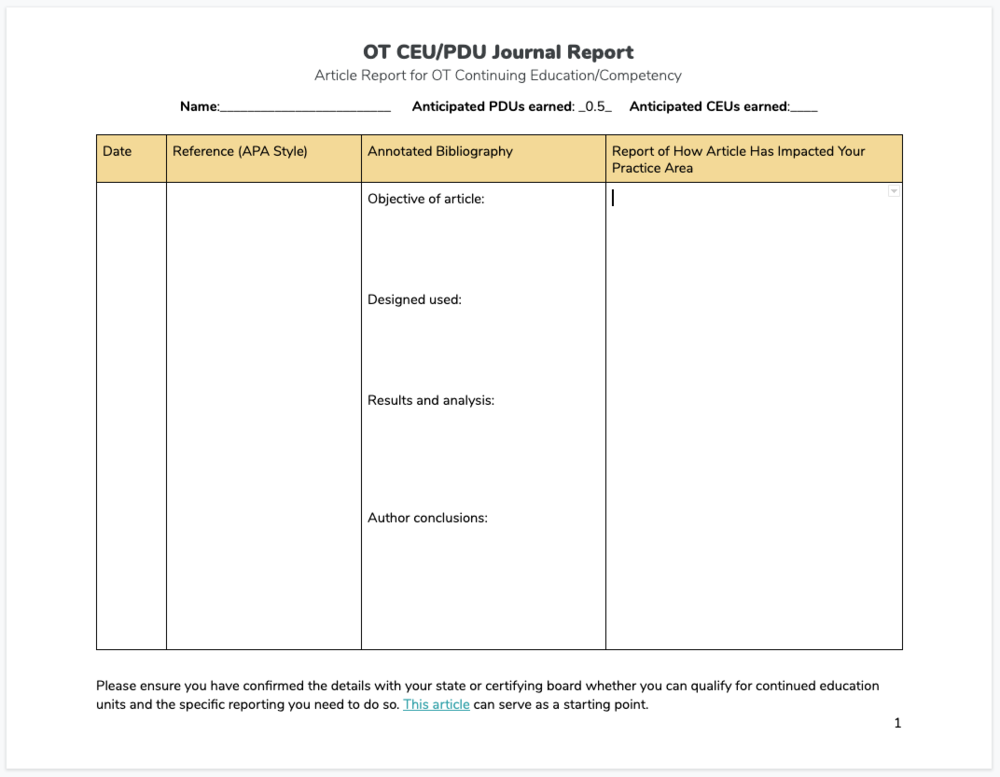
I’m a huge fan of occupational therapy research.
One of the reasons I’ve become such a research nerd is I believe that consuming primary research is one of the best ways to develop your clinical reasoning skills as an OT practitioner—and, ultimately, provide the best care possible to our patients.
If you’re a fellow research enthusiast, I have some great news for you…reading journal articles can score you some continuing education unit (CEU) credits in some states!
Reading journal articles can also count toward your professional development units (PDUs) for your NBCOT renewal, which we will cover below.
These continuing education activities are specific to the US. I would love to know about continuing education requirements in other countries, though. Also, if there is a way to get CEUs for reading journal articles in your state and I missed it, please let me know!
States where you can receive OT continuing education units by reading journal articles:

Illinois
The policy:
Per the Illinois Occupational Therapy Practice Act, Illinois will accept “independent study activities” as part of your CEU requirements. These independent study activities include reading books or journal articles, and you can get up to four (4) contact hours per renewal period.
The fine print:
Documentation shall include title, author, publisher, time spent, and date of completion. A licensee shall include a statement that describes how the activity relates to a licensee’s current or anticipated roles and responsibilities.

Kentucky
The policy:
Per the The Kentucky Board of Licensure for Occupational Therapy, Kentucky will accept “independent study” for CCUs (continuing competency units). “Independent study” may include reading books and journal articles, reviewing videos, or engaging in other activities of a similar nature. You may earn one (1) CCU for one (1) contact hour spent in independent study, and no more than six (6) CCUs will be awarded for independent study.
The fine print:
Documentation for this activity shall include: 1. Title, author, and publisher of the material; 2. The time spent on the material; 3. The date of completion; and 4. A statement that describes how the activity relates to a licensee’s current or anticipated roles and responsibilities.

Maryland
In Maryland, continuing competency requirements are waived if, at the time of renewal, you hold a valid and current NBCOT certification. So, read below about how you can read journal articles for NBCOT certification.
Or
The policy:
Per the Maryland Board of Occupational Therapy Practice, Maryland will accept “informal self-study” as a type of fulfillment of the continuing competency requirement (CCR). Informal self-study refers to journal articles or other reading opportunities with assessment, text books, video and audio tape, television, electronic media, seminars, workshops, and presentations. You will receive one (1) contact hour per one (1) hour of education.
Frankly, the document linked above is really confusing. It’s unclear what the maximum number of hours you can earn would be, so I recommend reaching out directly for clarification before you put all your eggs in the “informal self-study” basket!
The fine print:
The licensee shall provide a continuing competency requirement compliance report, an abstract of content from the provider, or verification of completion from the course provider.
The confusing part is that this is listed under “independent self-study,” so there’s no course involved for reading a journal article. As mentioned above, I’d definitely connect with the board for clarification.

Nebraska
The policy:
Per the Nebraska Department of Health and Human Services, OT licensees can engage in “informal self-study” for any combination of the following activities: reading related to OT practice, observing other OTs, viewing videotapes without a supervisor, or performing quality assurance or peer review studies. You may earn a maximum of two (2) contact hours of con-ed for each 24-month renewal period.
The fine print:
Your documentation for reading/viewing videotapes must include the name of the article, book or videotape, and a brief synopsis of what was learned. If you observed other therapists or participated in quality assurance or peer review studies, you must include a statement explaining what was learned.

Ohio
The policy:
Per the Ohio LawWriterⓇ Laws and Rules document for OT continuing education, OTs can earn contact hours for “informal independent study.” You can earn these credits for reading evidence-based book chapters and research journal articles relating to the clinical practice, management, or education of OT practitioners—and identifying how the information presented can be applied to one’s own practice, management, or education situation. One (1) contact hour will be provided per book chapter or journal article, and a maximum of four (4) contact hours can be earned from this category per renewal cycle.
The fine print:
Licensees must provide a copy of the article’s title page and the first page, and a written report summarizing the information and outlining how it can be applied by the license holder.

Washington
The policy:
Per the state of Washington website, The thirty hours of continuing education and professional development must be obtained through two or more of the activities listed in this subsection. A minimum of twenty hours must directly relate to the practice of occupational therapy as defined in RCW 18.59.020 and WAC 246-847-010. Any remaining hours may be in professional development activities that enhance the practice of the licensed occupational therapist or licensed occupational therapy assistant. Documentation for all activities must include licensee’s name, date of activity, and number of hours. Additional specific documentation is defined below:
(l) Self-study of peer reviewed, role-related professional journal articles, textbooks or chapters, or professionally developed multimedia and digital media educational materials. The required documentation for this activity is a typed, one-page synopsis of each item written by the licensee or a certificate from OT practice continuing education article. A maximum of ten hours is allowed per reporting period for this category. Time spent writing synopsis is not reportable.

West Virginia
The policy:
Per the West Virginia Board of Occupational Therapy’s Continuing Education and Competence document, a licensee may earn continuing competency credit for completion of a combination of “other activities and independent learning projects.” These projects may include—but are not limited to—a combination of reading, observing other therapists, viewing videotape quality assurance or peer review studies, and related professional activities which enhance knowledge and skill in a specific area. Licensees may earn half of one (.5) contact hour for each of these activities, with the total amount not to exceed six (6) of your total required contact hours per renewal period.
The fine print:
Licensees should maintain a detailed log of any of these “informal self-study” activities, including the type, subject, and source of self-study.
NBCOT Professional Development Units (PDUs) from reading journal articles
As a reminder, continuing education units (CEUs) count toward your state license, and this means that your CEU requirements will depend on where you live.
On the other hand, for OTs in the United States, professional development units (PDUs) are required every three years in order to renew your NBCOT certification.
The policy:
As I noted above, the NBCOT also awards PDUs if you read journal articles! According to the NBCOT guidelines for journal and text reading, you can read a journal article that is:
- peer-reviewed &
- practice-related
Reading two articles equals one PDU unit (of the 36 total required to renew). In order to receive the PDUs, you need to generate a written report that contains:
- dates of when you read the material
- an APA reference
- a brief description of the content, the validity of the research used or ideas presented, and conclusions drawn by the author of the text
- an analysis of how the article or textbook has assisted with improving the skills needed for your role
This sounds kinda complex, but the example report NBCOT gives is actually quite manageable.

The fine print:
It’s important to note that you can’t claim reading materials for PDU purposes if they are required for academic coursework or an audited course. For each textbook/journal article, you will need to provide an annotated bibliography that lists the APA reference for each reading, dates of when you read the material, a brief description of the content, the validity of the research used or ideas presented, and conclusions drawn by the author of the text. You must ALSO provide a report with an analysis of how the article or textbook has assisted with improving the skills needed for your role. Also, keep in mind that textbook readings cannot have a publication date exceeding more than five (5) years from time of renewal application, nor can they include required reading for academic coursework/audited courses/study groups that you’re in.
Let the OT Potential Club make this process even easier
I strongly believe that digging into the research (and wrestling with it a bit) is the best way to improve your care to your clients. That’s why I launched our journal club, the OT Potential Club.
We review a new journal article each week in the Club, and we’ve begun including a structured Google Doc with each article, so the logistics of generating your report are already done for you.
This means you’re sure to benefit from belonging to our online OT journal club. Whether you’re looking for CEU/PDUs, or simply hoping to up your therapy game, the OT Potential Club puts a new OT-related research article in your hands every single week!

Join the OT Potential Club
Find influential journal articles and quickly generate a report for CEU/PDU credit!
Conclusion
Hopefully, my fellow research enthusiasts read this article and found an even more exciting reason to geek out on the latest evidence!
When our state OT boards reward our commitment to staying on top of research, it’s always nice—but we should really be keeping up with evidence regardless of whether we earn con-ed credits. After all, the overarching purpose behind all this research is to ensure that we provide our patients with proven strategies to live better lives.

